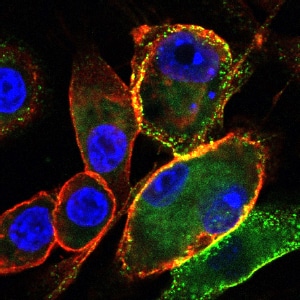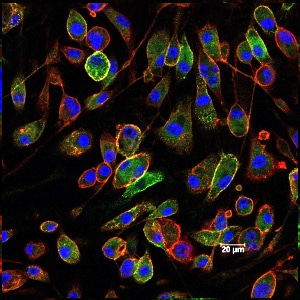Our
Science

Our Science

Asylia’s lead antibody, ASY-77A, has produced complete regression of various cancer types in pre-clinical models including solid tumors such as breast and colon cancer, and blood-related cancers like multiple myeloma
Asylia Therapeutics is developing novel immune modulating therapies for cancer, autoimmune and infectious diseases, which collectively impact tens of millions of Americans annually. Asylia’s platform centers on a fundamental mechanism of immunity – the presentation of antigens to the immune system. Its lead antibody, ASY-77A, enhances antigen presentation by targeting the extracellular form of Heat shock protein (HSP70), a molecule central to antigen delivery to the immune system.
HSP70’s role is especially crucial in shuttling tumor-derived (or autoreactive or viral) antigens to dendritic cells (DCs), which capture, process, and present tumor antigens to other immune cells in order to initiate the development of immune responses against all cancers (or self-antigens or viral antigens). In the tumor microenvironment, the function of DCs is suppressed through multiple mechanisms, thereby aiding and abetting tumor cell survival and precluding the development of robust anti-tumor immune responses. This contributes in many tumor types to either a blunting or complete abrogation of activity by immunotherapy, including immune checkpoint inhibitors (ICIs).


Confocal imaging of murine dendritic cells showing enhanced uptake of HSP70 induced by our lead antibody molecule.
ASY-77A’s mechanism of action also supports the likelihood that it would stimulate responses to therapeutic vaccines, and activate anti-tumor immune responses both alone and in combination with other therapies, including ICIs. Conversely, extracellular HSP70 acts as a central stimulating factor in autoimmune diseases by promoting self antigen-specific immune responses through DCs, marking inhibition of the uptake of HSP70-self antigen complexes as a rational approach to suppress autoimmunity. Other Asylia pipeline assets target antigens directly on cancer cells, eliciting potent anti-cancer opportunities. Moreover, there is strong potential to combine ASY-77A with other targeted therapies, chemo/radio therapeutics, immune therapies, and vaccine approaches that could significantly expand its benefit to cancer patients.
Cancer
Recruiting the patient’s own immune system to help fight their cancer is becoming a central strategy to improve patient outcomes, but tumors use a variety of mechanisms to suppress immunity and avoid such an immune attack. One key mechanism of resistance is the suppression of tumor antigen presentation to the immune system. Approaches that convert these immunologically ‘cold’ tumors into more inflammatory ‘hot’ ones would enhance and expand the effectiveness of tumor immunotherapy. Thus, drugs that enhance tumor antigen presentation and DC functions hold great potential to harness the promise of immunotherapy against cancer.
Asylia’s lead antibody, ASY-77A, has produced complete regression of various cancer types in pre-clinical models including solid tumors such as breast and colon cancer, and blood-related cancers like multiple myeloma. ASY-77A is truly unique in its immune mechanism, functioning to enhance presentation of endogenous tumor-derived antigens bound to HSP70 to DCs and activate DCs that in turn induce killer T-cell responses. Asylia is currently humanizing ASY-77A to initiate first in human safety and proof of concept studies.
Autoimmune and
Infectious Diseases
It is estimated that greater than 50 million Americans suffer from auto-immune diseases and the prevalence is rising. In addition to cancer antigens, HSP70 can also induce the presentation of self-antigens that can trigger auto-immune diseases. Therefore, Asylia is evaluating other antibodies that decrease antigen presentation in autoimmune disease models such as lupus erythematosus and type I diabetes mellitus.
In the infectious disease arena, the Asylia portfolio of anti-HSP70 antibodies holds promise for enhancing anti-viral immune response via increased presentation of virus antigens. Given the urgent societal need for Covid-19 therapy, Asylia is prioritizing its assets as possible therapeutics in the acute infection setting to speed development of anti-viral immunity.